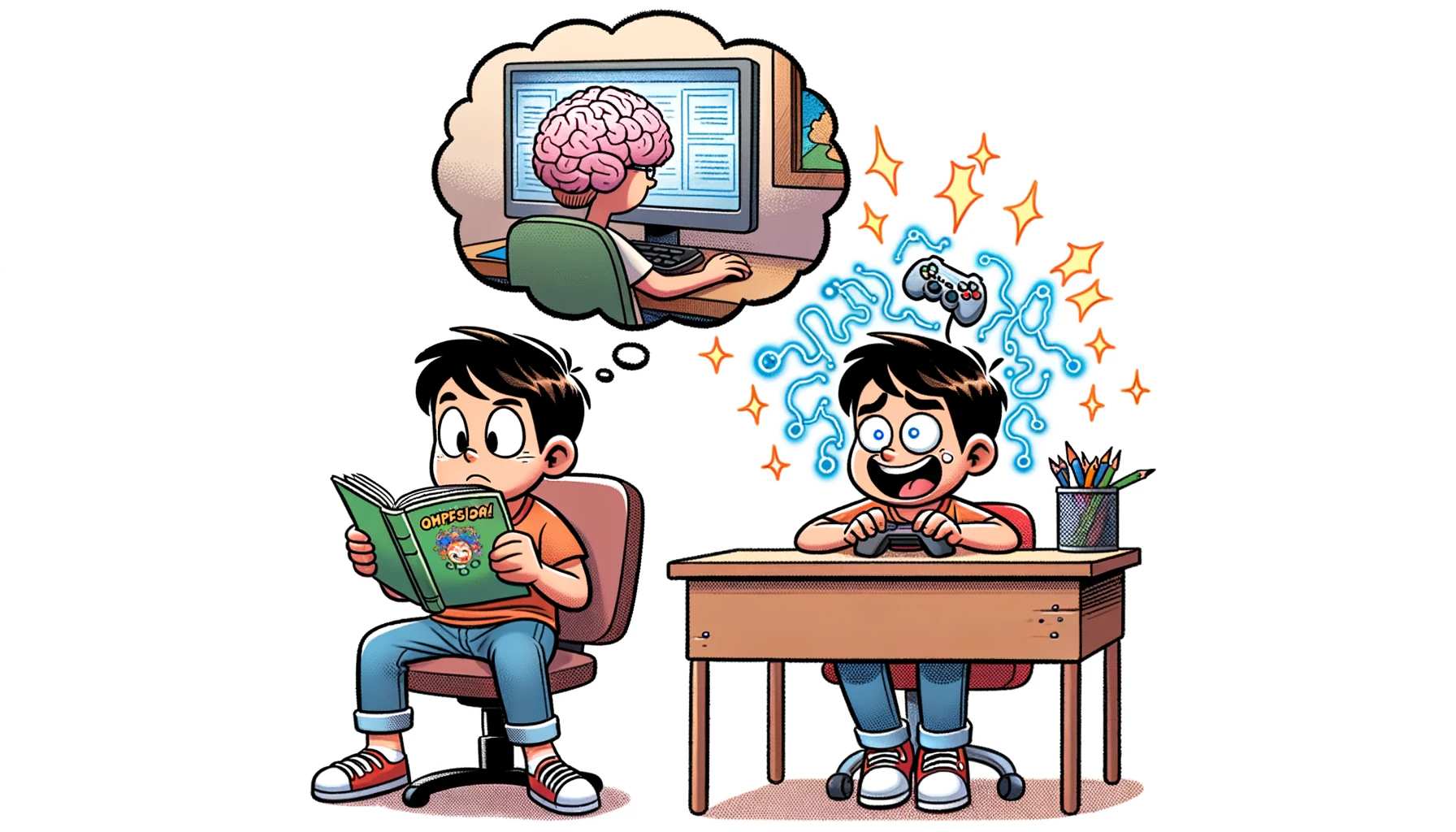Introduction
The Science Behind Game-Based Learning: More Than Just Play
Ever wondered why students are so engrossed in video games but can’t seem to focus the same way on their textbooks? The key to this puzzle lies in game-based learning effectiveness, a fascinating blend of cognitive psychology, neuroscience, and educational theory. This educational approach is more than just play; it’s a scientifically-backed method for enhancing learning.

In this blog post, we’ll explore the science that underpins the effectiveness of game-based learning. By understanding the ‘why’ and ‘how,’ educators and parents can implement this tool more strategically in classrooms and homes.
Unique Insight: Game-based learning is gaining traction, but there’s a gap between its popularity and our scientific understanding of its effectiveness. It’s like enjoying a magic trick without knowing the secret. Today, we’re revealing the science behind the magic.
Questions for Engagement:
- Have you ever implemented game-based learning in your educational setting?
- What are your initial thoughts on the effectiveness of this approach?
The Cognitive Benefits of Game-Based Learning Effectiveness
Why Cognition Matters in Education
Cognition is the mental process of acquiring knowledge and understanding. It’s the cornerstone of learning, and it’s where game-based learning effectiveness truly shines. By engaging students in a way traditional methods often can’t, game-based learning can significantly enhance cognitive skills like problem-solving, critical thinking, and spatial awareness.
The Science Behind Cognitive Enhancement
According to research, game-based learning has a moderate to strong effect on cognitive learning outcomes (Guerrero, J., 2022). Another study found that students exposed to game-based learning within problem-solving methods showed positive effects on both cognitive and affective aspects (Pratama, L. D., & Setyaningrum, W., 2018). These findings suggest that game-based learning is not just an educational fad; it’s a scientifically-backed approach to enhancing cognitive skills.

Unique Insight: The role of engagement in cognitive benefits is often overlooked. When students are fully engaged, they’re more likely to absorb and retain information, making the learning process more effective.
Real-World Applications
In the realm of mathematics, for instance, game-based learning has been shown to increase students’ interest from a medium to a high category, thereby enhancing their cognitive engagement (Pratama, L. D., & Setyaningrum, W., 2018). This is a clear indicator that the effectiveness of game-based learning extends beyond theoretical discussions and has practical applications in academic subjects.
Questions for Engagement
- Have you noticed an improvement in cognitive skills when implementing game-based learning?
- What cognitive skills do you think game-based learning impacts the most?
Emotional and Motivational Aspects of Game-Based Learning Effectiveness
The Emotional Connection in Learning
Emotions play a crucial role in the learning process. They can either enhance or hinder a student’s ability to absorb and retain information. Game-based learning effectiveness extends to emotional and motivational aspects, creating an environment where students are more likely to be engaged and motivated.
Scientific Evidence on Emotional Benefits
Research indicates that game-based learning can have a positive impact on emotional engagement. For example, a study found that game-based learning led to increased emotional and cognitive engagement in students (Guerrero, J., 2022). Another source highlights the emotional benefits of using video games as a learning tool (Edutopia).
Unique Insight: The balance between fun and learning is a delicate one. Game-based learning effectiveness lies in its ability to maintain this balance, making the educational process enjoyable without compromising on educational outcomes.

Real-World Applications
In practical terms, game-based learning has been shown to increase students’ interest in subjects like mathematics, thereby enhancing their emotional engagement (Pratama, L. D., & Setyaningrum, W., 2018). This emotional engagement is not just about making learning “fun”; it’s about making it more effective.
Questions for Engagement
- Have you observed an increase in emotional engagement in your students when using game-based learning?
- How do you think emotional engagement affects the learning process?
Neurological Research on Game-Based Learning Effectiveness
The Brain’s Role in Learning
The brain is the epicenter of all learning activities, and understanding its mechanisms can offer valuable insights into effective educational methods. Neurological research also supports the effectiveness of game-based learning, providing a rationale for its use in educational settings.
Neurological Findings Supporting Game-Based Learning
Neurological research offers compelling evidence for the effectiveness of game-based learning. For instance, a study from Archy Learning discusses the neurological aspects of game-based learning, such as the activation of the brain’s reward system, which can enhance learning (Archy Learning, n.d.).

Unique Insight: The brain’s “reward system” plays a significant role in game-based learning effectiveness. When students achieve a goal in a game-based learning environment, the brain releases dopamine, a neurotransmitter associated with pleasure and reward, which can make the learning experience more engaging and memorable.
Real-World Applications
The neurological benefits of game-based learning are not just theoretical; they have practical implications. For example, the activation of the brain’s reward system can make subjects like mathematics or science more appealing to students, thereby increasing their willingness to engage with the material.
Questions for Engagement
- Have you considered the neurological aspects when implementing game-based learning?
- What are your thoughts on the role of the brain’s reward system in learning?
Case Studies and Examples of Game-Based Learning Effectiveness
Why Real-World Evidence Matters
Scientific research is invaluable, but real-world examples and case studies bring the data to life. They offer tangible proof and practical guides for educators and parents interested in implementing game-based learning. In this section, we’ll delve deeper into specific case studies that demonstrate the effectiveness of game-based learning.
In-Depth Look at Case Studies
A study from Milligan College provides a rich tapestry of examples, showcasing how game-based learning can enhance both cognitive and emotional engagement in students (Guerrero, J., 2022).
History Through Game-Based Learning
One case study within the research focused on teaching history through a game-based platform. Students were able to make decisions that historical figures would have made through the game’s simulation of historical events. The result? Increased student engagement and a notable improvement in test scores.
Math Made Easy and Engaging
Another example from the same study centered on a math game designed to help students grasp complex algebraic concepts. The game used interactive puzzles and challenges to make the learning process more engaging. Students not only improved their problem-solving skills but also showed a greater interest in math as a subject.
Unique Insight: These case studies demonstrate the versatility of game-based learning effectiveness. They show that, whether it’s a complex subject like history or a generally dreaded one like math, game-based learning can be adapted to meet various educational needs.
Questions for Engagement
- Do you have any personal experiences or case studies that can attest to the effectiveness of game-based learning?
- What subjects do you think are ripe for a game-based learning approach?
Challenges and Considerations in Game-Based Learning Effectiveness
The Flip Side of the Coin
While game-based learning offers numerous benefits, it’s essential to consider the challenges and limitations that may arise. Understanding these challenges can help educators and parents implement game-based learning more effectively.
Scientific Insights into Challenges
Research from Milligan College points out some challenges, such as the potential for distraction and the need for adult guidance to ensure effective learning (Guerrero, J., 2022). These challenges underscore the importance of mindful implementation.

The Distraction Dilemma
One of the challenges highlighted is the potential for distraction. Games are engaging, but they can also divert attention away from educational objectives if not carefully designed and implemented.
The Need for Guidance
Another challenge is the need for adult guidance. While game-based learning can be highly engaging, it often requires a guiding hand to ensure that the educational goals are met and the learning is effective.
Unique Insight: Challenges are not roadblocks but rather signposts that guide us toward more effective implementation. By understanding and addressing these challenges, educators can optimize the effectiveness of game-based learning.
Questions for Engagement
- Have you encountered any challenges in implementing game-based learning?
- How did you overcome these challenges to ensure effective learning?
Actionable Conclusions for Game-Based Learning Effectiveness
Turning Knowledge into Action
Understanding the science, benefits, and challenges of game-based learning is crucial, but the next step is to turn this knowledge into actionable strategies. In this concluding section, we offer practical tips for educators and parents to implement game-based learning effectively.
Tips for Effective Implementation
- Customize to Fit Needs: Not all games are suitable for every educational context. Choose games that align with your educational objectives.
- Balance Fun and Learning: Ensure that the game maintains a balance between being engaging and educational.
- Provide Adult Guidance: Especially for younger students, adult supervision can help steer the learning experience in the right direction.
- Monitor and Adjust: Keep track of student engagement and learning outcomes, and be prepared to make adjustments as needed.
Unique Insight: Customizing game-based learning according to the cognitive and emotional needs of students can significantly enhance its effectiveness. It’s not a one-size-fits-all solution but a flexible tool that can be tailored to various educational settings.
Questions for Engagement
- What actionable steps will you take to implement game-based learning in your educational setting?
- Do you have any tips or strategies that have worked well for you?
Frequently Asked Questions on Game-Based Learning Effectiveness
What is Game-Based Learning Effectiveness?
Game-based learning effectiveness refers to the measurable impact of using games in educational settings to enhance cognitive, emotional, and motivational aspects of learning.
How Does Game-Based Learning Improve Cognitive Skills?
Game-based learning effectiveness is particularly strong in enhancing cognitive skills like problem-solving, critical thinking, and spatial awareness. Games often require these skills, making learning more engaging and effective.
Are There Emotional Benefits to Game-Based Learning?
Absolutely! Emotional engagement is a key factor in game-based learning effectiveness. Games create an environment where students are more motivated and emotionally invested in their learning.
What Does Neurological Research Say About Game-Based Learning?
Neurological research supports game-based learning effectiveness by showing that the brain’s reward system is activated during game-based learning, making the learning process more engaging.
What Challenges Should I Be Aware Of?
While game-based learning has many benefits, challenges like potential distractions and the need for adult guidance can impact its effectiveness. Being aware of these can help you implement it more effectively.
How Can I Implement Game-Based Learning Effectively?
For effective implementation, choose games that align with your educational objectives, balance fun and learning, and provide adult guidance when necessary. Monitoring and adjusting your approach can also enhance game-based learning effectiveness.
References
- Archy Learning. (n.d.). The Science Behind Game-Based Learning. Retrieved from Archy Learning Blog
- Edutopia. (n.d.). A Neurologist Makes the Case for the Video Game Model as a Learning Tool. Retrieved from Edutopia Blog
- Guerrero, J. (2022). The Effectiveness of Game-Based Learning in K-12 Education. Milligan College. Retrieved from Milligan College Library
- Pratama, L. D., & Setyaningrum, W. (2018). The Effectiveness of Game-Based Learning in Mathematics: A Case Study. Journal of Physics: Conference Series, 1097(1). Retrieved from IOPscience








Recent Comments